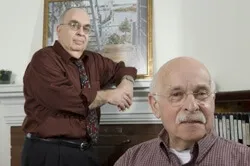Winston Churchill is often credited with saying that if "you're not a liberal when you're 25, you have no heart. If you're not a conservative by the time you're 35, you have no brain." Makes sense; everyone knows older people are more conservative and set in their ways. So why then was Churchill more conservative at age 15 than at age 35?
New research by Nick Danigelis, professor and chair of sociology, and Steve Cutler, professor of sociology and Distinguished Bishop Joyce Chair of Gerontology, strongly suggests that this long-held belief about older citizens being more rigid isn't true. Their findings, published in the October 2007 edition of the prestigious American Sociological Review in an article titled "Population Aging, Intracohort Aging, and Sociological Attitudes" has sociologists and politicians alike rethinking the attitudes and social and political leanings of older Americans.
The study is based on U.S. General Social Survey data from 25 surveys between 1972 and 2004 that measure the changes in attitudes that occur within cohorts at different stages in life. The political leanings of 46,510 Americans were examined with regard to how they felt about the political and economic roles of historically subordinate groups (e.g., women and African-Americans); the civil liberties of groups considered outside the U.S. mainstream (e.g., atheists and homosexuals); and privacy issues (e.g., right-to-die and sex between consenting adults).
Results showed that although change occurred in both the 18-39 and 60-and-over age groups, the movement among the older group was greater and was most often toward "increased tolerance rather than increased conservatism."
"It proves that some of the commonly held beliefs about older people being rigid and unwilling to change aren't true," says Danigelis. "Clearly both cohorts changed, but the older one changed more dramatically. In other words, getting older makes you more conservative, but only if you're a younger person," he adds with a wink.
Contributing to the 'aging' literature
When Danigelis looks out his second floor office on South Prospect Street he can see the old Bishop DeGoesbriand Memorial Hospital (now University Health Center) where he was born. After explaining that he went to elementary, middle and high school within a stone's throw of his office before attending UVM, Danigelis jokes about fitting the stereotype of the inflexible older American that his research debunks. But he and Cutler have been anything but stuck in a rut when it comes to research on aging. Cutler, past president of the Gerontological Society of America, has been researching age-related issues for three decades and has received numerous grants from the National Institute on Aging. His research with Danigelis is especially significant because it's among the first to show over an extended period of time that people age 60 and over become more liberal at a faster rate than their younger counterparts on a number of measures.
Danigelis and Cutler note that Americans who grew up in the Depression have different attitudes toward many issues than those who grew up in the 1960s. Their research, however, shows that although people tend to be shaped by defining issues during their lifetime, a general pattern of aging Americans changing their attitudes

Aging Liberally
UVM sociologists debunk stereotype that people grow more conservative as they age
ShareFebruary 29, 2008